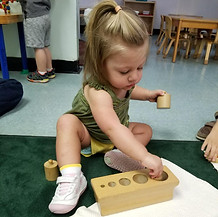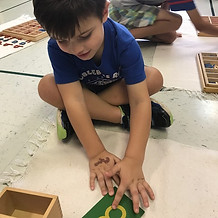
CURRICULUM




Infant / Toddler
In this program the Montessori Philosophy meets the needs of a 12-week to 36-month old child. Appropriate activities and experiences allow a child a smooth entry into the Early Childhood class. The low child-teacher ratio and small class size give each child the space to develop.
Maria Montessori believed that a child’s helper in early infancy had the noble task to create a foundation for all later development and learning. She believed that the educational needs of the child under thee years of age were extremely important but very different from those of the child past three.
The Montessori environment for children from infancy through three years must focus on, as its highest goal, the nurturing of sensitivity and caring among the children and adults in the environment. This time in the child’/s life is crucial in the development of trust, altruism and love, Our goal is not to be substitute parents, but to support and enhance the important role of parenthood.
During the first three years of life children are very dependent upon adults in their lives. They are able to explore the environment without assistance. Early in life a child is stimulated by interesting objects at close range. As the year progresses, the child’s range eventually expands as they learn to creep around and explore independently. At this level the prepared environment consists of a wide spectrum of activities and objects which are safe, cognitively stimulating, emotionally satisfying and developmentally appropriate.
The Montessori Toddler environment presents the child with a variety of appropriate experiences from which the child can choose freely. The environment is the “curriculum” for the child. Before three years of age, the child must have a wide range of experiences; after three years of age, the child refines and perfects new skills. It is assumed that in this manner, an appropriate match can be made between the child and needed learning experiences.
Early Childhood
Dr. Maria Montessori believed that no human being is educated by another person. She must do it herself or it will never be done. A truly educated individual continues learning along after the hours and years she spends in the classroom because she is motivated from within by a natural curiosity and love for knowledge. Dr. Montessori felt, therefore, that the goal of early childhood education should not be to fill the child with facts from a pre-selected course of studies, but rather to cultivate her own natural desire to learn.
In the Montessori classroom this objective is approached in two ways: first, by allowing each child to experience the excitement of learning by her own choice rather than by being forced; and second, by helping her to perfect all her natural tools for leaning, so that her ability will be at a maximum in future learning situations. The Montessori materials have this dual long-range purpose in addition to their immediate purpose of giving specific information to the child.

Kindergarten
All preparations for later academic work and for social and emotional development which have been so carefully nurtured in the three and four year old child are reinforced in the Kindergarten year. He will reap the benefits of his past work under the enthusiastic guidance of teachers who will share his joy in learning.
Having learned from older children, shared with his peers and helped those younger than himself, the Montessori Kindergartener has the opportunity to assume leadership within his class.
Elementary
As Montessori pre-school programs have proliferated, there has been a great demand for Montessori elementary classes. In these classes, children who have completed the Montessori program for three- to six-year-olds can continue learning individually or in small groups at their own pace. Long blocks of time encourage extended spans of concentration, uninterrupted by bells indicating a sudden change of subject.
Compared to the period preceding it, and that which follows it, Montessori believed that the second stage of development, ages six through twelve, is one of great stability.

Educational Field Trips
Music Program

Spanish Program - In Progress

Summer Program
Armand Bayou Montessori School summers are full of fun and excitement. Each summer’s activities and field trips are based on a given theme: oceanography, the rainforest, and more. Light academics and lots of fun!

CONTACT US
RESOURCES
(281) 480 - 1648 Phone
(281) 480 - 8880 Fax
NEWS & INTERESTING ARTICLES
Does kindergarten today require too much work?
Being a kindergartner today is very different from being a kindergartner 20 years ago. In fact, it is more like first grade.

